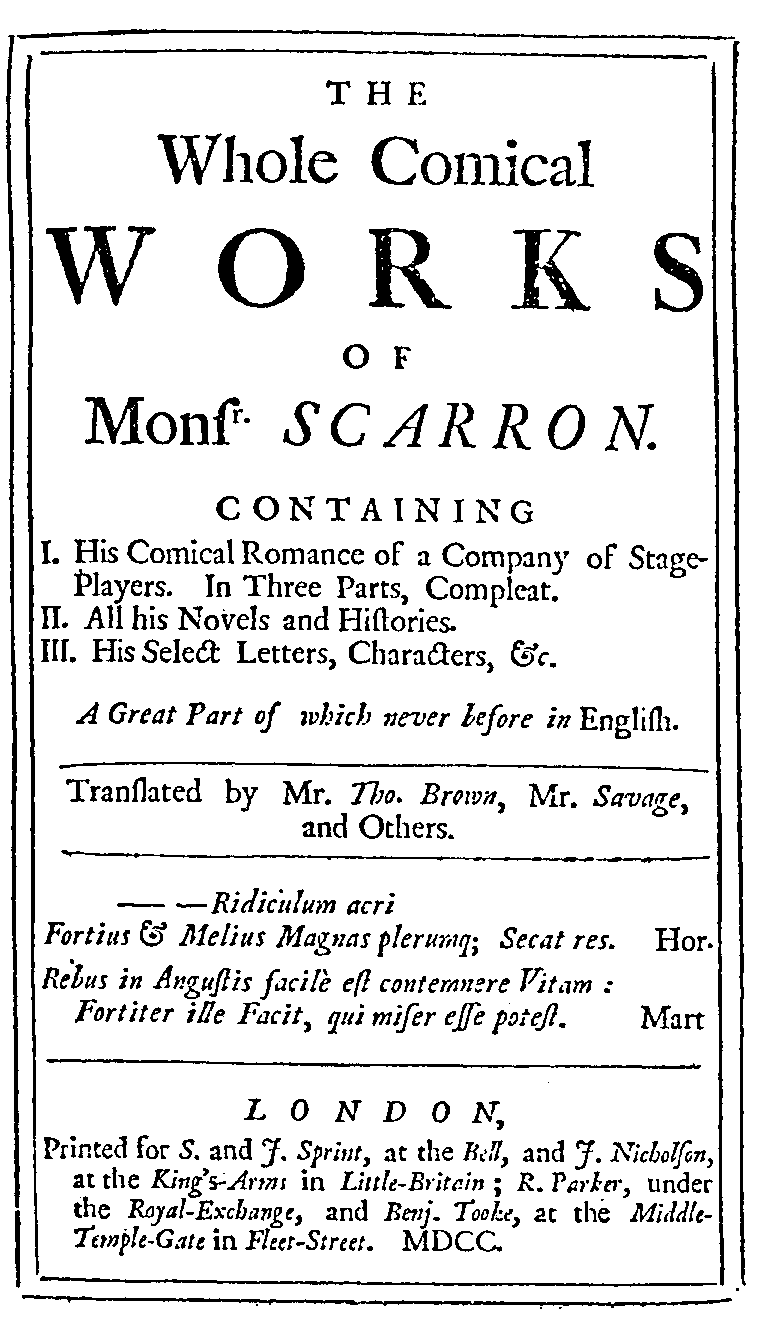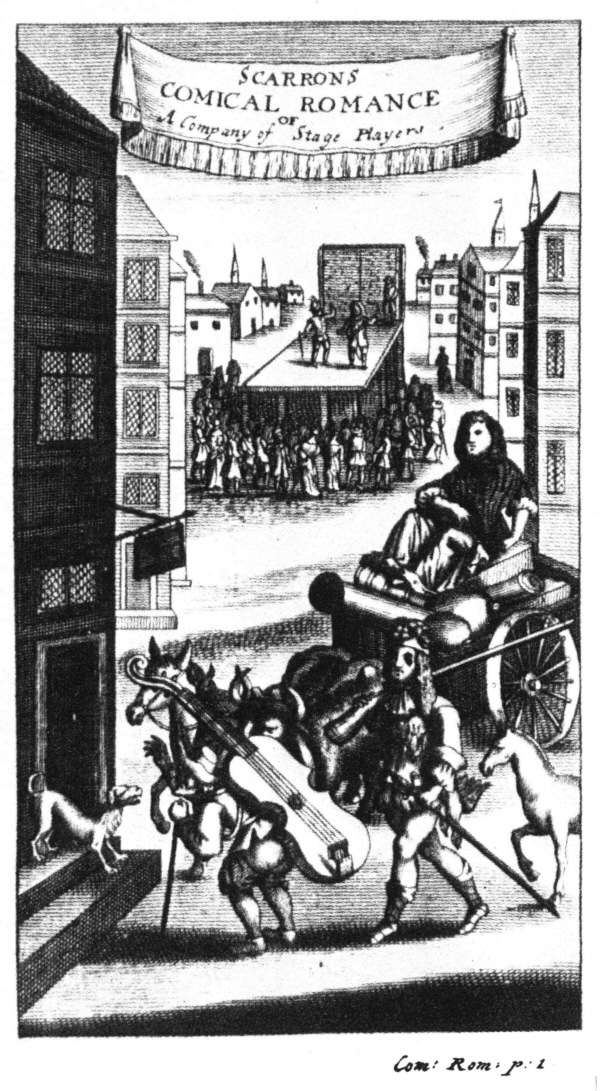![]() The Novel
The Novel
http://pierre-marteau.com/novels.html![]()

THE| Whole Comical| WORKS| OF| Monsr. SCARRON.| CONTAINING| I. His Comical Romance of a Company of Stage-|Players. In Three Parts, Compleat.| II. All his Novels and Histories.| III. His Selected Letters, Characters, &c.| A great Part of which never before in English.| [rule]| Translated by Mr. Tho. Brown, Mr. Savage,| and Others.| [rule]| — — Ridiculum acri| Fortius & Melius Magnas plerumq; Secat res. Hor.| Rebus in Angustis facile est contemnere Vitam:| Fortiter ille Facit, qui miser esse potest. Mart.| [rule]| LONDON| Printed for S. and J. Sprint at the Bell and J. Nicholson| at the King’s Arms in Little Britain; R. Parker, under| the Royal-Exchange and Benj. Tooke, at the Middle-|Temple-Gate in Fleet-Street. MDCC.
Sources: Le Roman Comique (1651 etc.)![]() and other writings by Paul Scarron.
and other writings by Paul Scarron.
| a | ||
| b | [...] 2nd edition (1703). | |
| c | [...] 3rd edition (London: J. Nicholson/ J. & B. Sprint/ R. Parker/ B. Tooke, 1712). [Identical setting.] |
|
| d | [...] 4th edition (1727). |
"Romance" with extensiv chapter about "Novels" and "Romances" (pt.1, chap.XXI, Comical Romance), numerous "Novels" included.
Comical Romance about a travelling group of actors on tour throgh the French provinces, everything presented with a good ammount of sarkasm, beautiful handling of the narrator's job (c.f. chapters like 1: p.20: "The shortest in this present Book" or 1: p.21: "Which perhaps will not be found very Entertaining"), open criticism of convntional "Romances". Framed by numerous "Novels" in the Spanish genre.

CHAP. XXI.
Which perhaps will not be found very
Entertaining.
THE Players ere very well receiv’d the Master of the House, who was a good honest Man, and one of the most considerable in those Parts. They had two Chambers allotted them to lay their Cloaths in, and make themselves ready for the Play, which was put off till after Supper. They likewise dined in private, and after Dinner, those that had a mind to walk, had the choice of a Grove and a Garden. A Counsellor of the Parliament of Rennes, and near Kinsman to the Master of the House, Accosted our Players, having discover’d Destiny to be a Person of more than Vulgar Judgement, and the Actresses, besides their great Beauty, to be such as could say more than just Parts they had learnt by heart. They Dis-|<101> coursed of things agreeable to their Profession, as Plays, and Dramatick Writers. This young Counsellor said amongst other things, that there was scarce any remarkable Subject for the Stage, that had not been blown upon; that all History was almost exhausted, and that modern Authors would at last be constrained to wave those Rules of Unity of Time, and stretch it beyond four and twenty Hours: That the generality of People did not apprehend what these Rules of the Stage were good for, being rather pleased with Action and Representation than Recitals: and therefore such Plots might be contriv’d as would meet with Applause, without either falling into the Extravagancies of the Spaniards, or being tied up to the strict Precepts of Aristotle. From Plays, they proceeded to talk of Romances. The Counsellor said, that nothing could be more diverting, than our modern Romances; that the French alone knew how to write good ones; however, that the Spaniards had had a peculiar Talent to compose little Stories, which they called Novelas, which are more useful and more probable Patterns for us to follow, than those imaginary Heroes of Antiquity, who grow oftentimes tedious and troublesome, by being over-civil, and over-virtuous. In short, that those Examples which may be imitated are at least as beneficial, as those that exceed all probability and belief: from all which he concluded that if a man could write as good Novels in French, as those of Miguel de Cervantes, they would soon be as much in Vogue, as ever heroick Romances have been. Roquebrune was not of the same Opinion: He affirm’d very positively, that there could be no Pleasure in reading Romances, unless they contained the Adventures of Princes, nay, and of great Princes too, and that for that reason Astrea only pleased him here and there. In what Histories can one find Kings and Emperors enough to make new Romances, said the Counsellor? We must feign ’em replied Roquebrune, as they usually do in fabulous Stories, which have no Foundation in History. I perceive then, return’d the Counsellor, that Don Quixot is very little in your Favour? ’Tis the silliest Book that ever I read replied Roquebrune; tho’ it be cried up by a great many Men of Wit. Have a care, said Destiny, it be not rather for want of Wit in you, than any Defect in the Book, that makes you entertain so different an Opinion of it. Roquebrune, would not hafe fail’d to answer Destiny, had he but heard what he spoke: But he was so taken up with telling his Feats to some Ladies, who were come near the Players, that he minded him not, and promis’d that fair Sex, he would write a Romance in five Parts, every Part to contain five Volumes, which should eclipse all the Cassandras, Cleopatras, and Cyrus’s, tho’ this last have the|<102> Sir-Name of the Grand, as well as the Son of Pepin. In the mean time the Counsellor was telling Destiny and the Actresses, that he had write some Novels in imitation of the Spaniards, promising he would communicate ’em to them. Thereupon Inzella told them, in an kind of French that hade more of the Gascon, than of the Spanish, that her Husband had the Name of a competent Writer in the Court of Spain having compos’d several Novels that were much esteem’d; some of which she had in Manuscript, which in her Opinion, deserv’d to be Translated into French. The young Counsellor being very curious of such kind of Compositions, told the Spanish Lady, she would do him a great favour in letting him have the perusal of ’em; which she very civily granted; adding withal, that no Body was better stor’d with Novels than herself; for as some Women in their Country, will sometimes try to write both in Verse and in Prose, so she had made it her Pastime, and could entertain ’em with some of her own making. Roquebrune confidently, according to his Custom, offer’d to turn ’em into French. Inezella, who was perhaps the sharpest Spaniard, that ever came over the Pirenes intoFrance, replied, that it was not only requisite to understand the French Tongue well, but that he must be equally Master of the Spanish also, and therefore he could not give him her Novels to Translate, til she was so well acquainted with the French Tongue, as to be able to judge whether he was qualified for Understanding. Rancour, who had been silent all the while, said, there was no doubt to be made of his Ability, since he had been Corrector of the Printing House: He had no sooner popp’d out these words, but he remembred Roquebrune had lent him Money, which made him pursue his Jest no farther; to which the other, dash’d out of Countanance at Rancour’s Words, reply’d, that he could not deny but that he had corrected some few theets, but then ’twas nothing but what he had publish’d of his own. Madam Star, to shift the Discourse, told Donna Inezella, that since she knew so many stories, she would often Importune her to Relate some of ’em. The Spanish Lady replied, she was ready to give her Satisfaction presently: They took her at her Word, and all the Company seating themselves round about her, she began a story, not in the very same Terms as you will find in the following Chapter; but yet so intelligibly, as made ’em guess she was Mistress of a great deal of Wit in Spanish, since she shew’d so much of it in a Language, to whose Delicacies she was a perfect stranger.
![]()
CHAP. XXII.
The Impostor Out-witted. A Novel.
o.s.